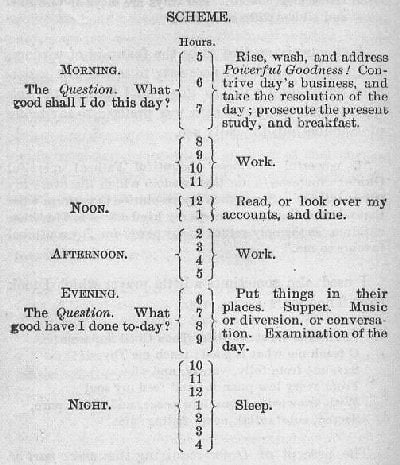The website "Daily Routines" has become one of my favorite reads. It's basically a collection of how interesting people organize their days. It's a self-reflationary time for me, especially when I realize that I need much different sleeping patterns. Here's a sample, who said this:
"I am a completely horizontal author. I can't think unless I'm lying down, either in bed or stretched on a couch and with a cigarette and coffee handy. I've got to be puffing and sipping."
It was none other than Truman Capote.
Then there's Benjamin Franklin's simplistic yet poetic schedule:
[Benjamin Franklin's Daily Routine]
There's also my favorite, Charles Darwin's:
The following is from Francis Darwin's reminiscences of his father. It summarizes a typical day in Darwin's middle and later years, when he had developed a rigid routine that seldom changed, even when there were visitors in the house.]
7 a.m.
Rose and took a short walk.
7:45 a.m.
Breakfast alone
8–9:30 a.m.
Worked in his study; he considered this his best working time.
9:30–10:30 a.m.
Went to drawing-room and read his letters, followed by reading aloud of family letters.
10:30 a.m.– 12 or 12:15 p.m.
Returned to study, which period he considered the end of his working day.
12 noon
Walk, starting with visit to greenhouse, then round the sandwalk, the number of times depending on his health, usually alone or with a dog.
12:45 p.m.
Lunch with whole family, which was his main meal of the day. After lunch read The Times and answered his letters.
3 p.m.
Rested in his bedroom on the sofa and smoked a cigarette, listened to a novel or other light literature read by ED [Emma Darwin, his wife].
4 p.m.
Walked, usually round sandwalk, sometimes farther afield and sometimes in company.
4:30–5:30 p.m.
Worked in study, clearing up matters of the day.
6 p.m.
Rested again in bedroom with ED reading aloud.
7.30 p.m.
Light high tea while the family dined. In late years never stayed in the dining room with the men, but retired to the drawing-room with the ladies. If no guests were present, he played two games of backgammon with ED, usually followed by reading to himself, then ED played the piano, followed by reading aloud.
10 p.m.
Left the drawing-room and usually in bed by 10:30, but slept badly.
Even when guests were present, half an hour of conversation at a time was all that he could stand, because it exhausted him.



.jpg)
.jpg)



.jpg)
.jpg)
.jpg)




